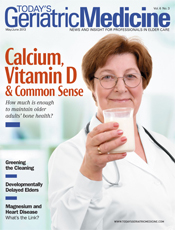
May/June 2013
Do You Really Care for Them?By Seth M. Keller, MD Aging affects all of us. The impact of growing older depends on your perspective and concern for some of the typical changes that occur: graying hair, hair loss, skin changes, and vision and hearing losses, among others. The unfortunate health consequences of aging also can be quite dramatic, such as vascular disease, cancer, and degenerative joint and neurologic diseases. When supports are required to assist in individuals’ life-related activities, our families and our society also are affected. Aging-related changes have an even greater impact upon individuals who have had lifetime disabilities. Basic adjustments and compensatory measures may be insufficient to cover functional decline, and the negative consequences to quality of life and activities of daily living can be dramatic. This phenomenon is commonly seen among people with intellectual and developmental disabilities (I/DD). Health care providers, especially those with an interest in aging, must be sensitive to and watchful for age-related health issues. A number of important factors must come together to enable the success of this process: caring, education, communication, data, and the formation of care partnerships. We assume that those who choose health care as a profession are humanistic and sensitive to the suffering poor health can cause. Having empathy and being able to discuss and appreciate the distress that illness creates in patients’ lives should enable the creation of a caring bond between a patient and his or her health care provider. What happens if these bonds are not formed? Adults with I/DD may have limited communication skills, and being able to connect to and relate to them may not be easy for most health care providers. Cultural sensitivity to values, person-centered care, and first-person language may not be part of clinicians’ experience and training. The term “retarded” is still spoken and written by many US health care practitioners despite the concerted effort by our government and social I/DD organizations to change this offensive and demeaning term to intellectual and developmental disability. How do you and your colleagues measure up? We may use the excuse that limited knowledge of I/DD in matters of health partially explains the problem. Our medical, dental, physician assistant, and nursing schools offer little training, if any. Health disparities in access to and quality of health care are widespread in the US. Reimbursement rates, time consumption, and complicated and challenging patients all may add to a reduction of clinicians’ experience and desire to take care of the I/DD population. Despite these hurdles, a good number of providers find it in their hearts to focus on the care needs of those with I/DD. The American Academy of Developmental Medicine and Dentistry and the Developmental Disabilities Nurses Association are just twoof the health care organizations in the United States that specialize in this area. Physical decline in older individuals with I/DD may be part of normal aging, but it also may signal an underlying progressive disease state. There are two prototypical examples of significant note. The first is of an individual who has cerebral palsy and begins to exhibit a decline in mobility later in life. This change may indicate the presence of an underlying compression of the spinal cord in the neck that would require possible surgical intervention to prevent further decline. A second common age- and I/DD-related clinical situation relates to individuals with Down syndrome who begin to show changes in behavior and exhibit difficulties with activities of daily living after they reach the age of 40. Could this be a sign of early Alzheimer’s disease? Do most geriatricians and primary care practitioners know or appreciate whether age-related decline is a concern in a patient with I/DD? The ability to appreciate the challenges that age-related decline place upon an I/DD individual requires a combination of being sensitive to the issues, being able to communicate with the self-advocate, families, and agency support staff, as well as having data and facts that can document a change from baseline. Working in partnership with the various players involved in care ensures the best possible outcomes. Do most health care providers deliver on this very important issue? Do you really care for them? — Seth M. Keller, MD, is a board certified neurologist with Advocare Neurology of South Jersey and a consulting neurologist for New Jersey Developmental Centers. He is the immediate past president of the American Academy of Developmental Medicine and Dentistry and cochair of the National Task Group on Intellectual Disabilities and Dementia Practices. He serves on The Arc of New Jersey’s Mainstreaming Medical Care Board and on the executive board for The Arc of Burlington County.
Resources • Developmental Disabilities Nurses Association (www.ddna.org)
|
